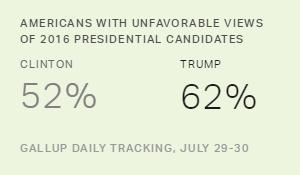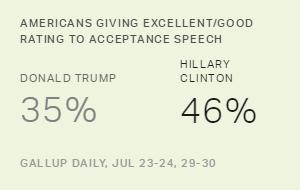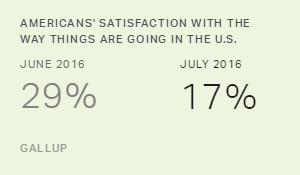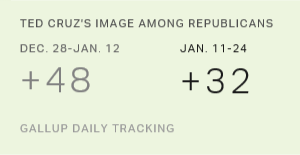Story Highlights
- 63% unfamiliar with Gary Johnson, 68% with Jill Stein
- Opinions of Johnson divided; views of Stein tilt negative
- Better known than most prior Green and Libertarian candidates
PRINCETON, N.J. -- Roughly two-thirds of U.S. adults are unfamiliar with third-party presidential candidates Gary Johnson of the Libertarian Party and Jill Stein of the Green Party. Those with an opinion are about evenly split in holding a positive or a negative view of Johnson, while they are slightly negative about Stein.
| Favorable | Unfavorable | No opinion | |||||||||||||||||||||||||||||||||||||||||||||||||||||||||||||||||||||||||||||||||||||||||||||||||
|---|---|---|---|---|---|---|---|---|---|---|---|---|---|---|---|---|---|---|---|---|---|---|---|---|---|---|---|---|---|---|---|---|---|---|---|---|---|---|---|---|---|---|---|---|---|---|---|---|---|---|---|---|---|---|---|---|---|---|---|---|---|---|---|---|---|---|---|---|---|---|---|---|---|---|---|---|---|---|---|---|---|---|---|---|---|---|---|---|---|---|---|---|---|---|---|---|---|---|---|
| % | % | % | |||||||||||||||||||||||||||||||||||||||||||||||||||||||||||||||||||||||||||||||||||||||||||||||||
| Gary Johnson | 19 | 18 | 63 | ||||||||||||||||||||||||||||||||||||||||||||||||||||||||||||||||||||||||||||||||||||||||||||||||
| Jill Stein | 13 | 18 | 68 | ||||||||||||||||||||||||||||||||||||||||||||||||||||||||||||||||||||||||||||||||||||||||||||||||
| ║┌┴¤═°, July 13-17, 2016 | |||||||||||||||||||||||||||||||||||||||||||||||||||||||||||||||||||||||||||||||||||||||||||||||||||
The results are based on a July 13-17 ║┌┴¤═° poll, conducted before the Republican and Democratic national conventions. It is unclear what impact, if any, those conventions have had on views of the Libertarian and Green Party candidates, who receive far less media attention than Republican candidate Donald Trump and Democratic candidate Hillary Clinton.
But given the unpopularity of and , it is possible Americans will be searching for an alternative candidate to vote for this fall. Typically, the Libertarian and Green Party candidates receive 1% or less of the vote. Current presidential preference polls that include the third-party candidates show Johnson averaging about 7% of the vote and Stein 3%, a stronger showing than each had in summer preference polls as their party's presidential candidate in 2012. However, support for third-party candidates in often greatly overstates the support they receive on Election Day.
Johnson, Stein Better Known Than Many Past Nominees
║┌┴¤═° has asked Americans for their views of some third-party candidates in past elections, including Libertarian and Green Party candidates, but not Johnson and Stein in 2012. In general, Johnson and Stein this year are better known than many former minor-party candidates, perhaps because it is the second presidential campaign for each.
However, they are not nearly as well-known as other third-party candidates who had already had a national profile before running for president on a third-party ticket, including Ross Perot, Ralph Nader and Pat Buchanan.
| Date | Have an opinion | Favorable | Unfavorable | ||||||||||||||||||||||||||||||||||||||||||||||||||||||||||||||||||||||||||||||||||||||||||||||||
|---|---|---|---|---|---|---|---|---|---|---|---|---|---|---|---|---|---|---|---|---|---|---|---|---|---|---|---|---|---|---|---|---|---|---|---|---|---|---|---|---|---|---|---|---|---|---|---|---|---|---|---|---|---|---|---|---|---|---|---|---|---|---|---|---|---|---|---|---|---|---|---|---|---|---|---|---|---|---|---|---|---|---|---|---|---|---|---|---|---|---|---|---|---|---|---|---|---|---|---|
| % | % | % | |||||||||||||||||||||||||||||||||||||||||||||||||||||||||||||||||||||||||||||||||||||||||||||||||
| Ross Perot (R) | 1996 ^ | 87 | 35 | 52 | |||||||||||||||||||||||||||||||||||||||||||||||||||||||||||||||||||||||||||||||||||||||||||||||
| Ross Perot (I) | 1992 ^ | 83 | 42 | 41 | |||||||||||||||||||||||||||||||||||||||||||||||||||||||||||||||||||||||||||||||||||||||||||||||
| Ralph Nader (I) | 2004 Sep | 81 | 33 | 48 | |||||||||||||||||||||||||||||||||||||||||||||||||||||||||||||||||||||||||||||||||||||||||||||||
| Pat Buchanan (R) | 2000 Jul | 77 | 28 | 49 | |||||||||||||||||||||||||||||||||||||||||||||||||||||||||||||||||||||||||||||||||||||||||||||||
| Ralph Nader (I) | 2008 Aug | 73 | 29 | 44 | |||||||||||||||||||||||||||||||||||||||||||||||||||||||||||||||||||||||||||||||||||||||||||||||
| Ralph Nader (G) | 2000 Jul | 64 | 42 | 22 | |||||||||||||||||||||||||||||||||||||||||||||||||||||||||||||||||||||||||||||||||||||||||||||||
| Gary Johnson (L) | 2016 Jul | 37 | 19 | 18 | |||||||||||||||||||||||||||||||||||||||||||||||||||||||||||||||||||||||||||||||||||||||||||||||
| Jill Stein (G) | 2016 Jul | 31 | 13 | 18 | |||||||||||||||||||||||||||||||||||||||||||||||||||||||||||||||||||||||||||||||||||||||||||||||
| Bob Barr (L) | 2008 Aug | 27 | 10 | 17 | |||||||||||||||||||||||||||||||||||||||||||||||||||||||||||||||||||||||||||||||||||||||||||||||
| David Cobb (G) | 2004 Sep | 27 | 6 | 21 | |||||||||||||||||||||||||||||||||||||||||||||||||||||||||||||||||||||||||||||||||||||||||||||||
| Michael Badnarik (L) | 2004 Sep | 23 | 7 | 16 | |||||||||||||||||||||||||||||||||||||||||||||||||||||||||||||||||||||||||||||||||||||||||||||||
| Michael Peroutka (C) | 2004 Sep | 18 | 5 | 13 | |||||||||||||||||||||||||||||||||||||||||||||||||||||||||||||||||||||||||||||||||||||||||||||||
| Harry Browne (L) | 2000 Jun | 8 | 3 | 5 | |||||||||||||||||||||||||||||||||||||||||||||||||||||||||||||||||||||||||||||||||||||||||||||||
| ^ Perot's favorable rating was measured numerous times in 1992 and 1996; figures are average for the year; (R) = Reform Party, (I) = Independent, (G) = Green Party, (L) = Libertarian Party, (C) = Constitution Party | |||||||||||||||||||||||||||||||||||||||||||||||||||||||||||||||||||||||||||||||||||||||||||||||||||
| ║┌┴¤═° | |||||||||||||||||||||||||||||||||||||||||||||||||||||||||||||||||||||||||||||||||||||||||||||||||||
For the most part, third-party candidates have not been especially popular, even among Americans who are familiar with them. Only Ralph Nader in 2000 had significantly higher favorable (42%) than unfavorable (22%) ratings, in a year when he won nearly 3% of the national popular vote. Nader was better known in his 2004 and 2008 campaigns for president, but much less liked, perhaps because of the belief he cost Al Gore the 2000 election. Perot, too, was better known but less liked in his second campaign for president in 1996 and received 8% of the vote, compared with 19% in 1992.
Johnson Less Appealing to the Political Right
Johnson is a former two-term Republican governor of New Mexico. As such, some experts view him as a greater electoral threat to Trump than to Clinton. And while that may still be the case in terms of how people cast their ballots, more conservatives and Republicans currently view Johnson negatively than positively. In contrast, moderates, liberals, independents and Democrats view him somewhat more positively than negatively. He is about equally unknown among all political groups.
| Favorable | Unfavorable | No opinion | |||||||||||||||||||||||||||||||||||||||||||||||||||||||||||||||||||||||||||||||||||||||||||||||||
|---|---|---|---|---|---|---|---|---|---|---|---|---|---|---|---|---|---|---|---|---|---|---|---|---|---|---|---|---|---|---|---|---|---|---|---|---|---|---|---|---|---|---|---|---|---|---|---|---|---|---|---|---|---|---|---|---|---|---|---|---|---|---|---|---|---|---|---|---|---|---|---|---|---|---|---|---|---|---|---|---|---|---|---|---|---|---|---|---|---|---|---|---|---|---|---|---|---|---|---|
| % | % | % | |||||||||||||||||||||||||||||||||||||||||||||||||||||||||||||||||||||||||||||||||||||||||||||||||
| Liberal | 22 | 15 | 63 | ||||||||||||||||||||||||||||||||||||||||||||||||||||||||||||||||||||||||||||||||||||||||||||||||
| Moderate | 24 | 16 | 59 | ||||||||||||||||||||||||||||||||||||||||||||||||||||||||||||||||||||||||||||||||||||||||||||||||
| Conservative | 14 | 20 | 66 | ||||||||||||||||||||||||||||||||||||||||||||||||||||||||||||||||||||||||||||||||||||||||||||||||
| Democratic | 20 | 17 | 64 | ||||||||||||||||||||||||||||||||||||||||||||||||||||||||||||||||||||||||||||||||||||||||||||||||
| Independent | 24 | 15 | 62 | ||||||||||||||||||||||||||||||||||||||||||||||||||||||||||||||||||||||||||||||||||||||||||||||||
| Republican | 13 | 22 | 64 | ||||||||||||||||||||||||||||||||||||||||||||||||||||||||||||||||||||||||||||||||||||||||||||||||
| ║┌┴¤═°, July 13-17, 2016 | |||||||||||||||||||||||||||||||||||||||||||||||||||||||||||||||||||||||||||||||||||||||||||||||||||
The potential threat Johnson poses to Trump may be a reason for the negative tilt among Republicans and conservatives who know him. In other words, they may view Johnson as more of a spoiler candidate than as one who shares their political views on many issues, most notably a preference for limited government.
Political liberals have the most positive views of Stein, suggesting they view her as more of an ideological ally than as a potential spoiler. This may be partly because she is getting lower support in national preference polls than Johnson is. Also, the 45% of liberals who have an opinion of Stein is far greater than the roughly one-third or less of other political and ideological groups that do.
None of the other political and ideological groups view Stein positively. This includes Democrats -- who might be more inclined to like her for her ideological views -- and independents, who may be more positive toward a third-party candidate.
| Favorable | Unfavorable | No opinion | |||||||||||||||||||||||||||||||||||||||||||||||||||||||||||||||||||||||||||||||||||||||||||||||||
|---|---|---|---|---|---|---|---|---|---|---|---|---|---|---|---|---|---|---|---|---|---|---|---|---|---|---|---|---|---|---|---|---|---|---|---|---|---|---|---|---|---|---|---|---|---|---|---|---|---|---|---|---|---|---|---|---|---|---|---|---|---|---|---|---|---|---|---|---|---|---|---|---|---|---|---|---|---|---|---|---|---|---|---|---|---|---|---|---|---|---|---|---|---|---|---|---|---|---|---|
| % | % | % | |||||||||||||||||||||||||||||||||||||||||||||||||||||||||||||||||||||||||||||||||||||||||||||||||
| Liberal | 29 | 16 | 56 | ||||||||||||||||||||||||||||||||||||||||||||||||||||||||||||||||||||||||||||||||||||||||||||||||
| Moderate | 10 | 19 | 72 | ||||||||||||||||||||||||||||||||||||||||||||||||||||||||||||||||||||||||||||||||||||||||||||||||
| Conservative | 8 | 20 | 72 | ||||||||||||||||||||||||||||||||||||||||||||||||||||||||||||||||||||||||||||||||||||||||||||||||
| Democratic | 16 | 16 | 68 | ||||||||||||||||||||||||||||||||||||||||||||||||||||||||||||||||||||||||||||||||||||||||||||||||
| Independent | 16 | 18 | 66 | ||||||||||||||||||||||||||||||||||||||||||||||||||||||||||||||||||||||||||||||||||||||||||||||||
| Republican | 7 | 22 | 71 | ||||||||||||||||||||||||||||||||||||||||||||||||||||||||||||||||||||||||||||||||||||||||||||||||
| ║┌┴¤═°, July 13-17, 2016 | |||||||||||||||||||||||||||||||||||||||||||||||||||||||||||||||||||||||||||||||||||||||||||||||||||
Implications
Johnson and Stein are similar to many prior third-party candidates in that they are unknown to most Americans. They are, however, better known than many past third-party candidates, including some who ran on the Libertarian and Green Party tickets. But they are not nearly as well-known as Perot and Nader, the third-party candidates who won the greatest share of the vote in recent elections.
As long as they remain lesser-known, the record indicates Johnson and Stein will not be significant factors in the 2016 election. At most, they have the potential to peel enough support from one of the major-party candidates to swing a close election or possibly alter the outcome in a few states.
And while both Johnson and Stein are registering perceptible support in national presidential preference polls today, the strong historical pattern has been for third-party candidate support levels to shrink as the election draws near. However, the 2016 campaign has already deviated from the historical playbook with a political outsider claiming the Republican nomination and whom the American public views more negatively than positively, even after their nominating conventions. Thus, if more voters dissatisfied with Trump and Clinton choose to register their displeasure by voting for a third-party candidate rather than voting for the "lesser of two evils," this year's third-party candidates could surpass their parties' vote totals in prior elections.
Historical data are available in .
Survey Methods
Results for this ║┌┴¤═° poll are based on telephone interviews conducted July 13-17, 2016, with a random sample of 1,023 adults, aged 18 and older, living in all 50 U.S. states and the District of Columbia. For results based on the total sample of national adults, the margin of sampling error is ±4 percentage points at the 95% confidence level. All reported margins of sampling error include computed design effects for weighting.
Each sample of national adults includes a minimum quota of 60% cellphone respondents and 40% landline respondents, with additional minimum quotas by time zone within region. Landline and cellular telephone numbers are selected using random-digit-dial methods.
View survey methodology, complete question responses and trends.
Learn more about how the works.




